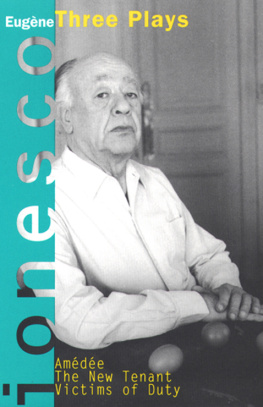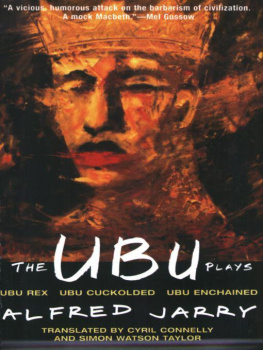
A MDE
T HE N EW T ENANT
V ICTIMS OF D UTY
W ORKS BY E UGNE I ONESCO
P UBLISHED BY G ROVE P RESS
Exit the King
Four Plays (The Bald Soprano; The Lesson; The Chairs; Jack, or The Submission)
A Hell of a Mess
Hugoliad: Or The Grotesque and Tragic Life of Victor Hugo
Hunger and Thirst and Other Plays (The Picture; Anger; Salutations)
The Killer and Other Plays (Improvisation, or The Shepherds Chameleon; Maid to Marry)
Killing Game
Macbett
Man with Bags
Notes and Counternotes: Writings on the Theater
Present Past, Past Present
Rhinoceros and Other Plays (The Leader; The Future Is in Eggs)
Three Plays (Amde; The New Tenant; Victims of Duty)
Eugne Ionesco
A MDE
T HE N EW T ENANT
V ICTIMS OF D UTY
Translated by Donald Watson

G ROVE P RESS
NEW YORK
Copyright 1958 by John Calder Limited
All rights reserved.
No part of this book may be reproduced, stored in a retrieval system, or transmitted in any form, by any means, including mechanical, electronic, photocopying, recording or otherwise, without prior written permission of the publisher.
Grove Press
841 Broadway
New York, NY 10003
CAUTION : Professionals and amateurs are hereby warned that these plays, being fully protected under the copyright law of the United States, the British Empire, including the Dominion of Canada, and all other countries of the Copyright Union, are subject to royalty. All rights, including professional, amateur, motion picture, recitation, public reading, radio and television broadcasting, and the rights of translation into foreign languages are strictly reserved. For amateur and stock rights, apply to Samuel French, Inc., 45 West 25th Street, New York, N.Y. 10010. For all other rights, apply to Eugne Ionesco and Margaret Ramsay, 14A Goodwins Court, London, W.C. 2, England.
First Grove Press Edition 1958
New Evergreen Edition 1988
ISBN: 0-8021-3101-8 (pbk.)
eISBN: 9780802190789
Library of Congress Catalog Card Number: 58-12139
Manufactured in the United States of America
CONTENTS
A MDE
T HE N EW T ENANT
V ICTIMS of D UTY
RETROSPECT
E UGNE I ONESCO has written in the Foreword to Volume I of the two states of consciousness in which his plays have their origin, two contrasting yet similar impressions that the ordinary, everyday world has changed its nature. Both the objects we find in real life and the words we use seem to him, at one extreme to become more rarefied, at the other to proliferate, and grow dense and heavy with matter. The one state promises escape, the other enslaves. Both experiences testify to the unreality of our real world.
To communicate this experience dramatically Ionesco starts by showing us familiar characters in a familiar worldusually presented in a familiar theatrical conventionand then lets the unfamiliar erupt through the picture until it disintegrates and we are faced with an illogical world, which has an alarming and unfamiliar logic of its own.
Ionescos treatment of story and situation, properties and set, character and emotion is all of a piece. Each element reflects the dynamic tension of his world: a world in which the familiar and the unfamiliar, the logical and the illogical coexist but never correspond. All this is expressed organically in the authors language.
Just as Victims of Duty reveals something of Ionescos approach to drama, so The Lesson , both implicitly and explicitly, demonstrates his attitude towards words. There he makes it clear that for him words gain in significance as they lose in meaning. Luckily, as they do so, they also tend to make as laugh. Ionescos style often produces comedy, but it does much more than that.
Mention of some of the problems that arose in translating these plays may help to throw some light on Ionescos use of language.
Perhaps the main point of interest was the discovery that his treatment varies quite distinctly from one play to the next. Mixed in different proportions in each play are the following styles, which we might call : banality, exaggeration (to include repetition and inconsequence), illogicality, dislocation and elevation.
The first, which I am taking to be roughly equivalent to ordinary conversation, is perhaps the basic style and can be found in all the plays. But our everyday platitudes and commonplaces have been enlivened in various ways, and these I shall consider later. These special uses apart, banality is employed almost all through The New Tenant , in most of Amde and in something like half of Victims of Duty . Some banalities are funny in themselves, but when used, as they are in the first two plays, to point a contrast between the strangeness of the action and a response normally reserved for familiar happenings, they can be highly amusing, and darkly significant as well. As an example, one could cite Amdes attempt to console Madeleine for the fantastic plight they are in with the words: Everyone has problems. Here it would seem to be the translators job to find the equivalent banalities of everyday conversation in his own language, without straining too pedantically after the exact form of the original.
Then Ionesco makes these banalities more interesting by varying the way they are used. Sometimes this simply takes the form of repetition: Amdes I must get down to it, or the Old Womans Did you put your pullover on?. Sometimes they seem more striking because they appear out of place in their context: many of the proverbial remarks in The Bald Prima Donna are perfectly normal in themselves ; they amuse us by their irrelevance, their inconsequence. Or he may use a special technique to produce a similar effect, as in Amde , when the voices of husband and wife cross, Amde ordering groceries at the window, Madeleine dictating over the telephone.
Next there comes some form of illogicality. A characteristic example in The Bald Prima Donna is the time it takes to go through the family history of the lady who used sometimes in winter, just like everyone else, to catch a cold. This play is full of illogical, almost surrealistic, humour: You may sit down on the chair, when the chair hasnt any, or Id rather see a bird in a field than a marrow in a wheelbarrow. It is full of verbal fun, puns and nonsense. Occasionally we find language being used in a similar way in The Lesson : the Professors reminiscence of his friend, the viscount. In Jacques the same technique is used, but to more serious purpose: I need only mention, in the final episode between Jacques and Roberta II, the sexually significant play on the French word chat , to which ultimately all language is reduced.
This kind of language is a fascinating nightmare for a translator, full of pitfalls. One can only go on revising, polishing, and hoping. Ionesco seems to have used The Bald Prima Donna as an experiment in verbal technique: it is more a question of finding equivalents in ones own language than of making a straightforward translation, and the danger is that one may get carried away. An additional problem is the fact that this play is set in England and has some details that seem uncharacteristic to an English audience, and some references that are too specifically French: these, of course, had to be changed. This is not surprising when we realise that Ionesco had never been to England at the time: he found most of his inspiration in the Assimil Method of learning English. Though it must not be forgotten he has said that if he had been learning Spanish, the play would have been set in Spain.
Next page








